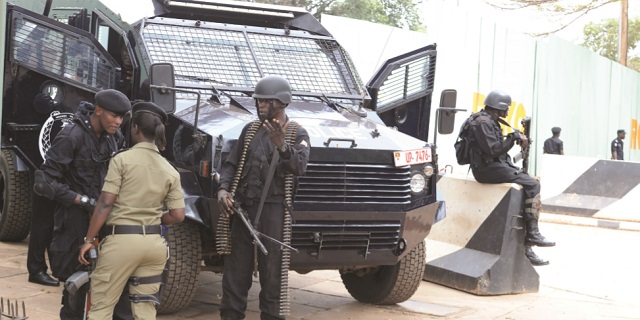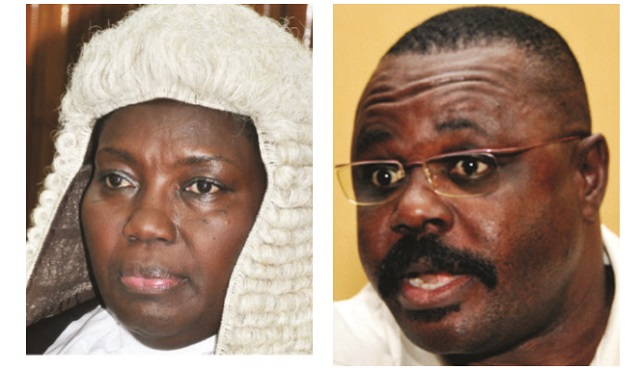
Transition politics
According to many observers, the fight over the age bill has to do with what is being called “the transition” or how Museveni who has been in power for 32 years goes out – sooner or later.
Those opposing limiting the age-limit say it is the last remaining defense in the 1995 Constitution of the fundamental principles, including ensuring a smooth transition and avoiding a repeat of Uganda’s history of political and constitutional instability.
They see the proposed amendment as the final nail in the coffin of democratic constitutionalism.
Museveni has not come out to state his position on the drive against the age limit but whatever he says, it is likely to be a flip flop on his earlier position. Previously, he is on record saying he would not seek re-election beyond 75. When asked whether he would ever consider running after clocking 75 years, Museveni answered: “absolutely not”.
Recently, however, as the debate caught momentum, he wavered, at one point saying there was no medical explanation showing that a 75-year old is incapable.
Museveni is now 73 years old and despite being in apparent good health is no longer as deft and nimble as he would love to be. The loyal cadres with who he came to power in 1986 are equally age devastated. Among his 77 ministers, less than ten are in his age bracket. The number includes his wife, Janet Museveni, the Prime Minister Ruhakana Rugunda, the Deputy PM, Kirunda Kivejinja, another Deputy PM Moses Ali, the Justice Minister Kahinda Otafiire, Gender Janat Mukwaya, Security Henry Tumukunde, and Minister without Portfolio Abdul Nadduli. Their average age is 65. Most are over 70 years old.
This is in total contrast with parliament, where the average age is possibly 40.To this group, even if Museveni is struggling to cling on to power; he represents the past and not the future. They know that they may lift the age limit for him now but nature is inevitably taking its course. But many of them also notice one thing; that up until now Museveni has always needed them for one thing; to sanitize his stay in power by amending the necessary laws. Lifting the age limit removes the last hurdle for Museveni to stay in power – for life. So they are determined to wring the most – in money terms – out of him.
President Museveni has, in a way, encouraged the culture of `votes for cash’. It’s now the norm that whenever parliament has to pass a major Bill, Museveni’s office gives ruling party MPs money to “go and consult their constituents”. In 2005, when the Presidential Two-Term Limit was removed from the constitution so that Museveni could run for more terms, each MP got Shs5 million under the arrangement. In 2015, the MPs got US$1.5 million to consult on Museveni’s sole candidature motion. Now they expect more. Some people who claim to be informed say the MPs have told Museveni that they each want up to Shs300 million. According to this informant, the MPs claim that since up to 75% of Ugandans oppose the removal of the age limit, according to an Afrobarometer survey, many of them might be thrown out of parliament in 2021 for passing it. So they want to be compensated now.
But the Museveni money has created another problem for Museveni. It has led to a springing up of numerous lobby groups, with each claiming to be the best placed to deliver the vote. For this, they claim money from Museveni.
Insiders say the State House team, which initially appeared at the forefront of the campaign had planned to clandestinely first mobilise the legislators one on one. Some of the architects in this team included; Lt.Col. Micheal Katungi, who coordinates Museveni’s party office; Molly Kamukama, President Museveni’s Principle Private Secretary (PPS) ; David Mafabi, the President’s Private Assistant for Political Affairs and Stephen Othieno, a personal assistant to the president’s son, Muhoozi Kainerugaba, among others. This group worked by organizing meetings with groups of influencers; including MPs.
But as the project gained momentum, NRM backbenchers on the Parliamentary Commission, including; Peter Ogwang, who was also part of the State House team meetings, Arinaitwe Rwakajara and Robina Nabbanja appear to have grabbed the deal and run with it.
The first sign of trouble from this group surfaced at a meeting they hurriedly called. Many NRM MPs rushed into the meeting because it was pushed as an NRM caucus meeting. Some of the MPs were, however, taken aback when the attendance list on which they had appended signatures was not, in fact, an attendance list but a list showing MPs who purportedly support of the removal of the age limit.
A source intimated to The Independent that Nabanja even cornered some of the legislators who she found at one of the hotels in Nakasero which has become the centre of mobilization for the age limit project, and made them sign. It was the `Anite ambush II’. Once again, any MP who protested risked being exposed as anti- Museveni, an offence carrying heavy penalties in NRM.
Related to this, another fight emerged in cabinet exposing warring camps in Museveni’s executive team. Once again Anite was at the centre. After the Sept.21 fiasco in which Magyezi failed to table his Bill and a red-bandana brigade of opposition MPs danced with joy at parliament for having “defeated” the NRM, Anite, Government Chief Whip Ruth Nankabirwa, and Minister of State for Tourism, Godfrey Kiwanda, convened a quick damage control press conference. But this too quickly turned ugly because the main take away was Anite’s bragging that “the army is on our side”. Anite’s statement was interpreted as a threat to unleash the army to harass opponents of the campaign.
In cabinet she attempted to defend her statements by claiming that having led the sole candidature campaign successfully in 2014, she knew what tricks to deploy in this campaign too. But some colleagues took issues with that.

An insider told The Independent that the fight against Anite among ministers was not just over the age limit. Apparently, there are long running divisions and jostling over being the most influential. Some fights are over personal issues but it is also clear that Museveni’s current ministers are a bunch of doves with a few hawks like Anite.
From Vice President Edward Ssekandi, to Prime Minister Ruhakana Rugunda, Government Chief Whip, Ruth Nankabirwa, and other influential old timers like Adolf Mwesigye (Defense), Matia Kasaija (Finance), Tom Butime (Local government), Ephraim Kamuntu (Tourism), Kahinda Otafire (Justice), and more, the standard conduct is more of cooing than purring. But then come the Anites, Henry Tumukunde, Frank Tumwebaze, Abdul Nadduli, Janat Mukwaya, Beti Kamya and others among the newer crop, and more sharp tongues and raised voices erupt. This group rarely works as a team with each pushing their own agenda. The result is a divided, inefficient group where the vitriolic juniors tend to push the mild seniors out of the way and Museveni is left to fire-fight from crisis to crisis. Observers say on top of opposition from critics, Magyezi’s proposed bill also appeared caught up in this mess.
 The Independent Uganda: You get the Truth we Pay the Price
The Independent Uganda: You get the Truth we Pay the Price



This is a informative post.I had never seen like this post.I learn many think about law.